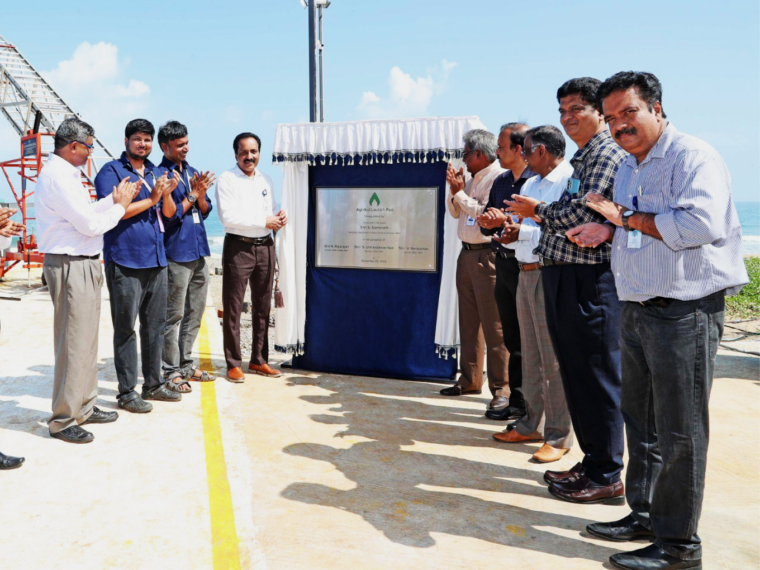
The facility will enable Agnikul to launch its vehicles from the base while working under the oversight of ISRO
The facility was inaugurated by ISRO Chairman S Somanath in the presence of other senior officials
Agnikul recently bagged $20 Mn as part of its ongoing Series B round from Silicon Valley-based VC firm Rocketship.vc
In a first for an Indian spacetech startup, Agnikul Cosmos has built its own launchpad and mission control centre at Satish Dhawan Space Centre in Sriharikota.
The facility will enable Agnikul to launch its vehicles from the base while working under the oversight of ISRO. The startup’s upcoming guided and controlled launch will be carried out from this launchpad itself.
The facility was inaugurated by ISRO Chairman S Somanath in the presence of other senior officials including ISRO centre directors on November 25.
“The first exclusive launch pad for a private launch vehicle has come up at Satish Dhawan Space Centre (SDSC). Now India can travel to space from one more space platform. Thanks to Agnikul,” said Somanath.
Reacting to the development, Agnikul chief executive officer (CEO) and cofounder Srinath Ravichandran said, “The ability to launch from our own launchpad while still working with ISRO’s launch operations teams is a privilege that we have been granted by ISRO and IN-SPACe (Indian National Space Promotion and Authorization Centre) and I am deeply grateful to them for the same.”
The facility is divided into two sections – Agnikul Launchpad (ALP) and Agnikul Mission Control Centre (AMCC) – which are 4 km away from each other.
As per the startup, the launchpad has been built to support liquid-stage controlled launches as well as to address the requirements for ISRO team to monitor key flight safety parameters during launches.
The facility has also been designed in a way that data and other critical information can be continuously shared with ISRO’s Mission Control Centre.
This comes as Agnikul prepares for its maiden demonstration launch which will be a controlled and guided mission with a vertical launch. ‘Agnibaan’ is a highly customisable two-stage launch vehicle which is capable of carrying up to 100 kg payload to low-earth orbits.
The announcement comes weeks after the Chennai-based spacetech startup announced another successful test firing of the world’s first single piece 3D printed engine in collaboration with ISRO. Called ‘Agnilet’, the engine is fully designed and manufactured in India.
Founded in 2017 by Srinath Ravichandran, Moin SPM and SR Chakravarthy, Agnikul is an IIT-Madras-incubated spacetech startup that has become one of the first Indian private enterprises to sign a deal with ISRO and IN-SPACe to build its projects.
The startup recently bagged $20 Mn as part of its ongoing Series B round from Silicon Valley-based venture capital (VC) firm Rocketship.vc. It had also raised $11 Mn as part of its Series A fundraise last year.
Agnikul is backed by marquee investors including Andreessen Horowitz general partner Sriram Krishnan, billionaire Anand Mahindra, Zerodha CEO Nithin Kamath and AngelList founder Naval Ravikant.
The startup largely competes with players such as Skyroot, Dhruva Space, Pixxel and Astrome in the highly competitive space.
Indian Spacetech Sector On The Rise
This comes at a time when the Indian spacetech sector is taking big strides. Earlier this month, Hyderabad-based Skyroot Aerospace became the first Indian startup to launch a rocket into space.
Close on the heels of that, Pixxel launched its third hyperspectral satellite ‘Anand’ aboard ISRO’s PSLV C54 mission. The mission also facilitated the launch of Dhruva Space’s two nano-satellites – Thybolt-1 and Thybolt-2 – into space.
Meanwhile, reports continue to emerge that the government is looking to revamp the sector with a new policy framework to spur more local players. As per an Inc42 report, the Indian commercial spacetech market is projected to soar to $77 Bn by 2030.






























 Ad-lite browsing experience
Ad-lite browsing experience